†Mautodontha consobrina was a species of small air-breathing land snails, terrestrial pulmonate gastropod mollusks in the family Charopidae.

Begonia consobrina is a species of plant in the Begoniaceae family. It is endemic to Ecuador. Its natural habitats are subtropical or tropical moist lowland forests and subtropical or tropical moist montane forests. It is threatened by habitat loss.
Palicourea consobrina is a species of plant in the family Rubiaceae. It is endemic to Peru.
Lissotestella consobrina is a species of minute sea snail, a marine gastropod mollusc, unassigned in the superfamily Seguenzioidea.

Cotalpa consobrina is a beetle of the family Scarabaeidae.
Trypeta consobrina is a species of tephritid or fruit flies in the genus Trypeta of the family Tephritidae.

Consobrina’s Darkwing is a moth of the family Noctuidae. It is found in North America, from North Carolina to Louisiana. Specimens have been recorded from all of the south-eastern states in the range except Alabama and Tennessee.
Nothoadmete consobrina is a species of sea snail, a marine gastropod mollusk in the family Cancellariidae, the nutmeg snails.
Terebra consobrina is a species of sea snail, a marine gastropod mollusk in the family Terebridae, the auger snails.
Nothoadmete is a genus of sea snails, marine gastropod mollusks in the family Cancellariidae, the nutmeg snails.

Lepidiota consobrina, common name consobrina cane grub, is a beetle of the Scarabaeidae family. It is a pest of sugar cane and occurs from Mossman to Gordonvale, changing from a one-year life cycle south of Cairns to a two-year life cycle further north.
Mesocolpia consobrina is a moth in the family Geometridae first described by William Warren in 1901. It is found on São Tomé Island, Angola, DR Congo, Kenya, Nigeria, Sierra Leone and South Africa.
Pseudosphex consobrina is a moth of the subfamily Arctiinae. It was described by Francis Walker in 1856. It is found in the Amazon region.

Sybra is a genus of beetles in the family Cerambycidae, containing the following species:

Festuca paniculata is a grass with culms 60–120 cm long, endemic to central, southwestern, and southeastern Europe and northern Africa.

Sybra umbratica is a species of beetle in the family Cerambycidae. It was described by Pascoe in 1865.
Sybra bioculata is a species of beetle in the family Cerambycidae. It was described by Pic in 1925. It contains four subspecies: Sybra bioculata bioculata, Sybra bioculata quadrinotata, Sybra bioculata sikkimana, and Sybra bioculata tigrina.

Sybra ordinata is a species of beetle in the family Cerambycidae. It was described by Bates in 1873.
Sybra pascoei is a species of beetle in the family Cerambycidae. It was described by Lameere in 1893.
Vespula consobrina, the blackjacket, is a species of stinging wasp in the family Vespidae.








